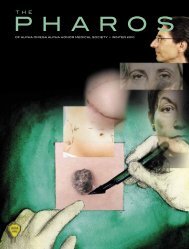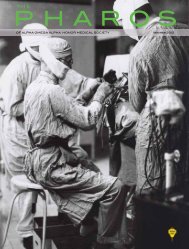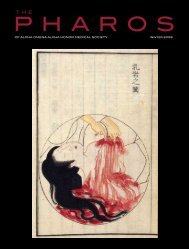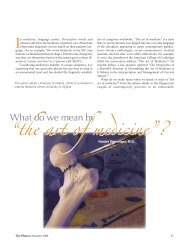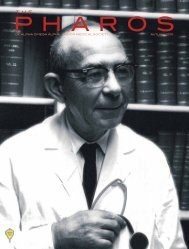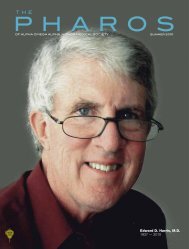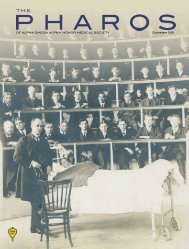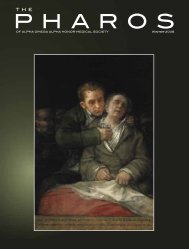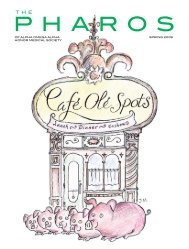The Pharos - Alpha Omega Alpha
The Pharos - Alpha Omega Alpha
The Pharos - Alpha Omega Alpha
You also want an ePaper? Increase the reach of your titles
YUMPU automatically turns print PDFs into web optimized ePapers that Google loves.
Dr. Stone’s “Whittling: <strong>The</strong> Last Class.” Reading this remarkable<br />
poem prompted me to review my notes from Dr.<br />
Stone’s visit to Lynchburg, reflect on the poem, and relate<br />
some of the things I learned.<br />
“Wood” is first a metaphor for life. Whittling our life, living<br />
it, gives it shape. “Make small cuts.” If you don’t, you may<br />
create a life you never intended. Go slow, don’t rush into<br />
things. Take time to think things through. But don’t idle or<br />
obsess, keep moving—“it’s the discovery that keeps the fingers<br />
moving.” And remember—time is short. Make wise decisions<br />
“before angina comes like a pair of pliers.” Create a career and<br />
life that fits your interests, talents, and personality. <strong>The</strong>re is<br />
enough wood to go around for everyone.<br />
Making wise decisions is not easy to do. Physicians train<br />
for many years, but most of us know it takes many more to<br />
become a good doctor—if we are willing to learn from our<br />
mistakes, learn from our patients and colleagues, and keep<br />
learning our profession and craft. And are we wise enough to<br />
be good people? To have time for family, friends, and personal<br />
recreation —to prevent burnout, or worse, angina’s grip?<br />
“Always whittle away from yourself and toward something.”<br />
If you whittle away from yourself and toward something bigger<br />
than yourself, you are less likely to get hurt. Have goals—and<br />
makes those goals bigger than you. Physicians understand<br />
this: it’s the paradox of altruism. Search for and move toward<br />
important things like truth and wisdom, realizing there are<br />
limits to your understanding.<br />
“Know when to stop.” Strive to know your own heart and<br />
the hearts of your patients, but don’t push too far or strive<br />
too hard, lest you lose all you’ve gained. Wisdom is knowing<br />
when to stop, knowing when you have arrived at a truth (or a<br />
diagnosis!) that is good enough, true enough.<br />
“Wood” is also metaphor for poetry. Whittling is how<br />
you write it. Make small cuts. Go slow. Think about every<br />
word and punctuation mark. What is really necessary? Write<br />
about things outside of you. Good poetry reaches out and<br />
resonates with many readers. Find novel ways to express<br />
universal truths, understanding that there are limits to your<br />
ability to articulate them. Know when to stop writing—the<br />
point where you have expressed “what is true or nearly true,<br />
or true enough.”<br />
John Stone spent a distinguished career at Emory University<br />
School of Medicine, practicing and teaching cardiology to<br />
several generations of medical students, residents, and fellows.<br />
In his practice and in his poetry he focused his attention<br />
on the heart. In a collection of his essays entitled In the<br />
Country of Hearts: Journeys in the Art of Medicine, he refers<br />
to two hearts: the literal heart—the focus of the cardiologist<br />
Dr. Stone—and the metaphorical heart, that of the poet John<br />
Stone, who wrote, “I am speaking now of the heart as a synonym<br />
for sensibility, sensitivity, as the seat of the emotions, if<br />
you will—the heart about which Pascal wrote, ‘<strong>The</strong> heart has<br />
its reasons which reason knows nothing of.’ That heart.” 4 It’s<br />
the organ pumping empathy to the hands, faces, and mouths<br />
of physician-healers. <strong>The</strong> heart that takes in the beauty of<br />
golden gingko trees on a cold autumn day that then flows out<br />
as poetry from a poet like John Stone.<br />
One of the last rules of poetry Dr. Stone discussed that<br />
memorable day was this: memorize a poem every once in a<br />
while. He suggested the following poem by Derek Mahon—a<br />
poem to help physicians cope with death and dying. And a<br />
perfect poem to honor the life of the physician-poet, John<br />
Stone:<br />
Everything Is Going to Be All Right<br />
How should I not be glad to contemplate<br />
the clouds clearing beyond the dormer window<br />
and a high tide reflected on the ceiling?<br />
<strong>The</strong>re will be dying, there will be dying,<br />
but there is no need to go into that.<br />
<strong>The</strong> poems flow from the hand unbidden<br />
and the hidden source is the watchful heart.<br />
<strong>The</strong> sun rises in spite of everything<br />
and the far cities are beautiful and bright.<br />
I lie here in a riot of sunlight<br />
watching the day break and the clouds flying.<br />
Everything is going to be all right. 5<br />
References<br />
1. Stone J. A lifetime of careful listening: A centennial retrospective<br />
on the work of William Carlos Williams (1883–1963). JAMA<br />
1983; 250: 1421–25.<br />
2. Gianakos D. Commentary on John Stone’s poem, “Death.”<br />
Acad Med 2011; 86: 224–25.<br />
3. Stone J. Music from Apartment 8. Baton Rouge (LA): Louisiana<br />
State University Press; 2004: 81–82.<br />
4. Stone J. In <strong>The</strong> Country of Hearts: Journeys in the Art of<br />
Medicine. New York: Delacorte Press; 1990: 7.<br />
5. Mahon D. Selected Poems. London: Penguin Books; 2000: 78.<br />
<strong>The</strong> author’s address is:<br />
Lynchburg Family Medicine Residency<br />
2323 Memorial Avenue #10<br />
Lynchburg, Virginia 24501<br />
E-mail: deangianakos@yahoo.com<br />
<strong>The</strong> <strong>Pharos</strong>/Autumn 2012 25



